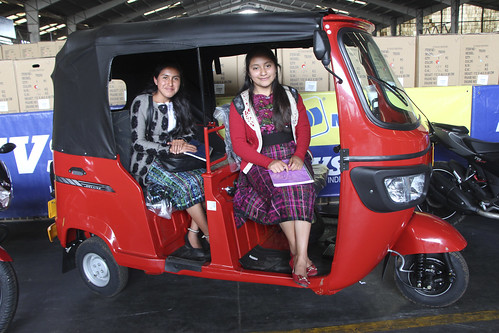Clara Barton. Marie Curie. Margaret Hutchinson Rousseau. What do these people have in common? (Cue Jeopardy music.) What is “women in STEM”? You got it!
Barton, Curie, and Hutchinson Rousseau all used their STEM (aka: science, technology, engineering, and mathematics) backgrounds to change the world. But, even though women are now half of the labor force in some countries, women in STEM fields remain a minority. In the United States, women make up half of the college-educated workforce, but only 29% of the science and engineering workforce (National Girls Collaborative Project).
Jenny is one such STEM-savvy seventh-grader on a mission. Let’s call her the next Suzanne Morrow. (Who is one of the most famous female veterinarians of all time, Alex?) Like Morrow, Jenny dreams of becoming a veterinarian so she can help sick animals. Going into a STEM career is challenging enough…now imagine also living in a poor, rural village in Guatemala.

Jenny has three younger siblings—none of them are in school right now due to her family’s limited resources. Her dad works sporadically unloading trucks in Guatemala City or as a day laborer in the fields when work is available. But, Jenny’s mission is to become a veterinarian—she won’t let these challenges stand in her way. “I get good grades and like to study”, she says. “My favorite subject is natural sciences, because I like learning about nature and the human body.”
Jenny is not alone in her passion for STEM. Many girls in the Rise Youth Development Program also dream of entering math or science fields. Yesica dreams of becoming a nurse. Gladys wants to be an accountant. Through Rise Program field trips to Guatemalan companies like Motos Masesa, the Rise students learn of careers available in STEM fields. They participate in workshops on critical topics like gender equality and self-esteem.

Who says learning about STEM careers has to be boring?
Katherine Ruwe, a chemical engineer and CoEd supporter, has been working hard to ensure that more girls in Guatemala have the opportunity to pursue STEM careers. Katherine says, “I’m lucky to be at a point in history when other women have already paved the way in STEM careers. I think it’s important for girls to be able to pursue whatever careers they aspire to.”
She began her career as a process engineer for Arkema, a chemical company that produces specialty chemicals and advanced materials. The company’s Arkema Fund for Education supports associations that promote education, and Katherine recently helped CoEd receive a generous grant from Arkema!

Katherine graduating as a chemical engineer
“There are so many great opportunities in STEM. It’s important that girls are able to explore paths that are not seen as traditionally feminine so that they aren’t limited in their career options.”
Katherine also sponsors a Rise scholar named Kimberly. What advice would she give to female Rise scholars interested in STEM careers? “I would encourage them to continue on in their education and take advantage of any opportunities that they can. There will be lots of hard work on the path to going into a STEM field, but it is worth the challenge when you finally make it!”
A woman in STEM helping out Guatemalan girls who also want to work in STEM fields? We can’t get enough of it! Thanks to Rise sponsors like Katherine, girls in rural Guatemala are finally getting their chance to achieve their dreams. You can help change the status quo in Guatemala too.
Want to join the movement?
*Interested in sponsoring Jenny? Click here to read the rest of her bio.
